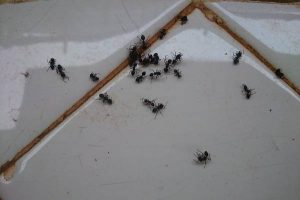WHY DO ANTS COME OUT IN SPRING?
Serving Vancouver WA | Portland OR | Beaverton OR

As the weather starts to warm up, you may notice more ants crawling around your yard, patio, or even inside your home. Ants are one of the most common insects in the world, and their arrival every spring happens like clockwork. Why do ants come out in spring? In this blog post, we will explore the biological and environmental factors that influence the behavior of ants in the spring and why they seem to become more active during this time of year.
Why Do Ants Emerge in the Springtime?
You don’t see as many ants during the winter because there are fewer of them aboveground. Ants are ectothermic, which means that their body heat is regulated by external temperatures rather than internally.
In practical terms, this means that when the weather gets cold around fall and winter, most ants die or return underground. The ants that go underground stop eating and drinking, and their heart rates and breathing slow. They enter diapause, a similar state to hibernation until the weather warms back up. In the springtime, when ants emerge, you’re seeing them wake up from their diapause.
Why Do Ants Come Inside in the Spring?
By the time they wake up, ants have burned off all of the food and nutrients they stored during the fall. They’re voraciously hungry, and their immediate objective is to find a source of food.
They will look anywhere – indoors or out – but if your home happens to be the place where they find food, they will keep coming back. Once ants find a food source, they are likely to keep relying on it until they can’t. Moisture is also something that ants look for. They need to hydrate to survive. If they find a water source in your home, they will keep coming back to the proverbial well.
Food and water aren’t the only reasons ants might come inside in the spring. Weather can also be a factor. Ants will search for shelter during heavy rains, or in the event of an unexpected late spring cold snap they’ll migrate inside seeking warmth.
Queens also leave their old nests during spring to mate and form new colonies. It’s possible she will find your home has exactly the features she desires for her next colony.
Eliminate Those Pests Today!
Leave your information and we will call you back in the next 30 minutes.
How Can You Prevent Ants in the Springtime?
It’s always better to prevent an ant problem than deal with one after they’ve moved in. Once an ant colony is established in your home, solving the problem can feel like an uphill battle. The single most important thing you can do to prevent ants in the springtime is clean. Yes, it’s that simple but that doesn’t mean it’s easy. Pay special attention to these areas:
- Keep a tidy house: This is the biggest part of preventing an ant colony from infesting your home. If there’s no food for them, they will go elsewhere. Of course, this can be easier said than done since ants don’t need a lot of food to survive.
- Make sure your kitchen is spotless: Since this is where the majority of food debris and residue can be found – goes a long way toward eliminating ants in all parts of the house. Particularly in the springtime when ants are most likely to be on the move, a clean kitchen can help prevent these pests for the rest of the year. Of course, don’t forget to clean up any crumbs or food residues in other parts of the house too if you eat there.
- Clean up spilled pet food: And don’t forget about pet food dishes and bowls!
Best Ant Prevention Tips for the Spring
Sometimes, cleaning isn’t enough. Here are some things you can do to control indoor ants during the springtime:
- Bait Stations: These traps may have a spotty track record for eliminating established indoor ant colonies, but they can be effective at alleviating ant problems.
- Destroy Nests/Colonies: Nests can be difficult to find, but if you do, there are some highly effective treatments you can apply directly to them.
- Fix Leaky Plumbing: Similar to eliminating food residue, if you can eliminate traces of moisture, you will make your home a hostile environment to ants.
- Seal Any Openings to Your House: Ideally, do this before springtime to stop roving ants from coming indoors.
How Do You Get Rid of Ants in the Spring?
If you’re dealing with a significant ant infestation during the spring months, we recommend calling an experienced ant exterminator. When ants establish a colony in the springtime, they can be tough to get rid of. They’ll spend the entire season gathering food and multiplying, and because your home is climate-controlled, they can continue to be active into the fall and winter.
Don’t wait another day – call us now and reclaim your space from ants so you can enjoy your spring!
Back to Ant Exterminators, Removal & Control







